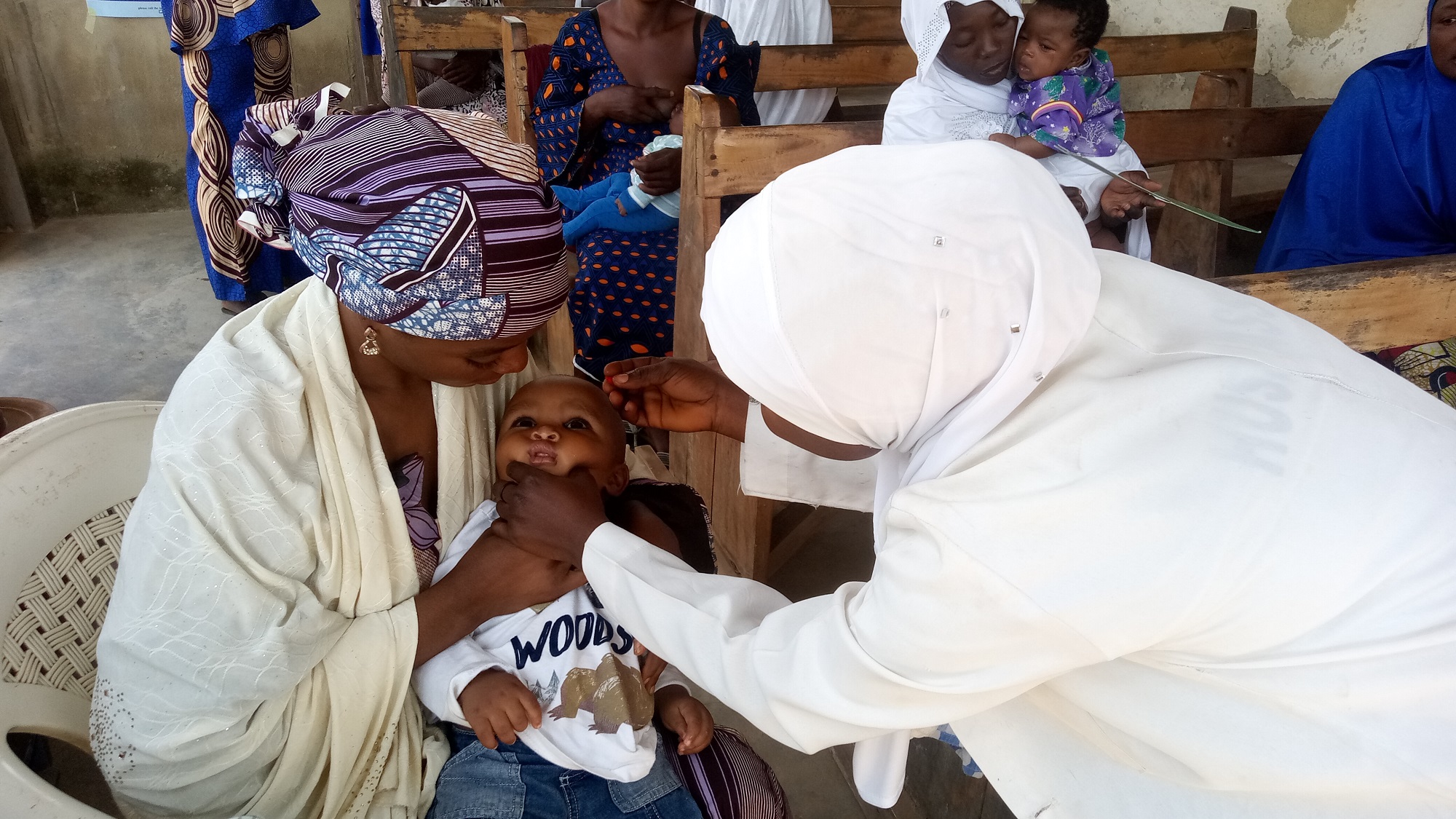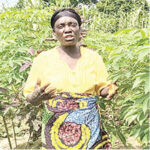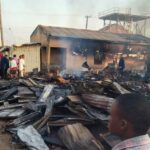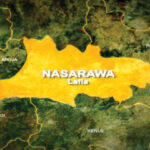On one Thursday morning in early December, environment health officer, Beatrice Abeks, is making babies cry.
She is updating their immunisation schedule—with antigens, some in drops, other in injections: BCG, pentavalent vaccine, IPV, PCV, measles, meningitis A, yellow fever, tetanus toxoid, OPV.
- COVID-19: Don’t be complacent, vaccines won’t come soon – FG warns
- We’re satisfied with work on Abuja-Kano road —FG
She is not at a health centre. She is manning a fixed vaccination post.
Parents are being mobilised to bring their children to her.
Early morning, she has administered antigens to seven children so far. The day before, she did 29.
“Some are babies who took BCG at birth but were never brought back for other vaccines,” she says. “Those have to be updated.”
Early December started the campaign—Re-intensified Routine Immunisation—to catch up on the vaccine schedule for millions of children under the immunisation coverage radar.
The fixed post is a rallying spot for the community of Angwan Dan Kanzo in Akwanga local government area—and Lauratu Umar is the rallying voice that echoes through the community, mobilising women to come out with their infants.

“I care about children and educate women on health. I go house-to-house and compel women to bring out their children,” she says.
When mothers don’t have the time or simply will not be bothered, she takes it upon herself to bring the children to the post personally.
“If I hear of a woman who is delivered of a baby, I visit to enquire about immunisation.
“If they haven’t got it done, I advise and encourage them. And if they don’t have the time, I convince them and then take the baby to hospital.”
On this Thursday, she has brought three children to the post.
Later in the day, she is to return to the children’s homes with a backup of religious leaders and health officials to confront defaulting parents.
Defaulters get reported to the Jam’atu Nasril Islam, an umbrella for the Nigerian Muslim Community, headquartered in Kaduna.
A secretary of the group is in the community to tease out problems with residents.
“Some mothers welcome us, but there are settlements where they don’t pay attention to us, nor accept to bring out their children for immunsiation,” says Altine Simon, health educator for the council area.
“With the help of the JNI secretary, he moves with us to convince them through their husbands so we get access to the mothers.”
Angwan Dan Kanzo sits right at the heart of Akwanga, not a typical rural community but the reluctance to immunisation still encountered is being linked to ignorance, according to health officials in the area.
“The information has gone beyond this environment on the importance of vaccination.
“For some, they believe God will protect them. If God will protect them, they feel there is no reason for them to take their children to be immunised,” says Simon.

Get it or get out
In Wamba council area, mothers are not taking chances.
Zainab Ahmed has three children, and her last is four months old, but is right at the Model Primary Health Centre in Wamba.
On a Thursday morning during the week of reintensified immunisation, 20 children have gotten their immunisation updated. The day before, it was 19.
Also there is Hussaina Musa, with her nine-month-old Luksin Auwal. “My child is very strong and fat, thank you,” she says. Her baby is a posterchild for exclusive breastfeeding.
She was quick to advise women on what to do. “I want to advise them to bring their children here for immunisation, because it is very good for your child,” she says.
The facility two years ago switched things up to ensure immunisation services are available daily.
With the intensified immunisation, it sees around 30 babies a day, many of them from hard-to-reach areas within its catchment area.
Caregivers, who don’t turn up, are met on their doorstep, says Hadiza Waju, second-in-charge at the facility.
“We shifted to daily immunisation because we were having defaulters.
“They say ‘this is market day, I won’t be able to come’. So now we are open all week, 24 hours a day, and they don’t have any excuse.
“Everybody should get access to immunisation activities, that’s why we do it daily—and to meet our target.”
It is a popular decision, and the community—from grassroot to the throne—are up for it.
The community has been known to threaten residents and nomadic families refusing vaccination with banishment.
Village and district heads have been sanctioned for not ensuring residents in their domain cooperate with health officials.
“If you want to succeed in your leadership, you must be prepared to set things on ground,” says HRH Rtd Justice Lawal Musa Nagogo, the Oriye Rindre, and a former grand Khadi of Nasarawa State.
“You must be diligent in the discharge of your duties.”
Meetings between health officials and districts heads hold on designated Fridays at his palace.
The heads take the information back to their domains.
Town criers and drummers disseminate the message when needed.
“When we go out for immunisation, any place that is found not to cooperate, we penalise the district head.
“We have had to suspend some. I told him, ‘for not getting your people to cooperate, it means you are not interested in the welfare of your people’.”
The sanctions work for Wamba. “In the first place, they take it in their mind that the chief is not tolerating nonsense. They know I am serious,” the ruler says.
He takes interest in personal visit to health centres to render “moral satisfaction” to his subjects at their time of need. At other times, he’s had to foot drug bills out of his pocket.
“If the people are not alive, if they are not well, how do you expect them to see you, listen to you and obey you?” he questions in defence. “Will you go to the mortuary and exercise your rulership there?”
Health officials bringing intervention into Wamba have to through the council area’s health educator Aliya Abba.
He is the link to the palace, has 24-hour access to the ruler and, when that fails, has the ruler on speed dial.
For that, he has been crowned the Wakilin Tsabta, the ruler’s representative for health matters, wellness and well being.
The designation and access strips all bureaucracy when it comes to health issues, and “that is what makes Wamba different, compared to other local government areas,” says Abba.
Wamba is recording better numbers with regards immunisation compared to other council areas.
The system that removes the red tape in Wamba has been and is beyond the ruler and his adviser.
“It has been there before he assumed the throne,” says Abba.
“The only different with others is that he crowned me as his representative.
“His late father, any time we come here to sit, he sends form.
“It is a chain that continues. I want to believe that even after him or me, that system will continue because our target is the people of Wamba.
“It is not me Aliyu or him as Oriye Rindre, but the entire local government that is our priority.”

Influx and a balance of numbers
Karu is a council area in Nasarawa, and a special case.
It sits on the border with the Federal Capital Territory, in the shadow of the splendour of the country’s capital.
But its relationship with Abuja is affecting immunisation figures in Nasarawa.
Thousands of residents in Karu are workers squeezed out of Abuja by astronomical rent.
They live in Karu but cross the Nasarawa state border every day in commute to work.
By reason of formal employment, they have access to the National Health Insurance Scheme but their health management organisations means they are listed in hospitals within the city centre.
There, they swell the number of clients seeking health services.
In Karu, where they are captured in different catchment areas as residents, they have no business seeking care in the council areas health facilities—and that is shortchanging the area in numbers.
“Our population is great. People here are not resident, they come, they go, some stay.
“The influx every now and then is changing,” says Shade Oladayo, immunisation officer for Karu council area.
“Sometimes you immunise even more than your target, because at any point in time, people can come in and leave.
“Some come in and leave at any point of the immunisation, some may not finish. That’s why some don’t complete their immunisation.”
It is a Friday morning, and in a glitzy health centre, there are 17 mothers with their babies turning up at around 10am.
It is less than 15 minutes by road into Abuja, traffic discounted.
The difficulty gives health workers a tough time, and makes the council area seem to underachieve its target.
“Seventy percent of people here work in Abuja and are enrolled with NHIS so they never come whatever you tell them.
“They go elsewhere where they are registered,” says Yusuf Asibat, health educator for Karu council area.
“If they are receiving here, they will be adding since they are already captured as targeted population.
“But when they are not receiving it here, they will be giving us a minus.”
The belief is that making the numbers reflect reality comes down to policy.
“It is a thing of policy. People stay here because of the proximity.
“Most cannot afford accommodation in Abuja, so they come here.
‘They work in Abuja so the [insurance] scheme captures them where they are working.
“Assuming the policy allows them to be captured here and receive services here, that is when they will be added here in numbers,” says Asibat.
Back in Akwanga, Umar and Simon have been to visit the mother of children who had to be brought in by a different adult.
It turns out the families recently moved in from Katsina to settle in Akwanga.
The vaccination schedules for their children are just being updated.

 Join Daily Trust WhatsApp Community For Quick Access To News and Happenings Around You.
Join Daily Trust WhatsApp Community For Quick Access To News and Happenings Around You.

